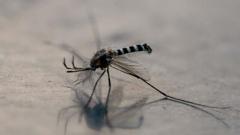The country has declared a health emergency following 34 fatalities linked to a yellow fever outbreak, urging citizens to get vaccinated as travelers prepare for the Easter holiday.
**Colombia Issues Health Emergency as Yellow Fever Claims Lives**

**Colombia Issues Health Emergency as Yellow Fever Claims Lives**
Colombia faces a national health crisis after recent deaths from yellow fever prompt urgent vaccination efforts.
In response to a devastating yellow fever outbreak that has already claimed the lives of at least 34 individuals, Colombia has declared a nationwide health emergency. Health authorities associated with the outbreak report that 74 confirmed cases of the disease have emerged, with a staggering mortality rate nearing 50% among those infected.
Yellow fever, an infectious disease transmitted by specific mosquitoes, is preventable through vaccination, which is available free of charge in Colombia. Health Minister Guillermo Alfonso Jaramillo emphasized the need for vaccinations ahead of Easter weekend, a period when many Colombians travel to regions where the disease is more prevalent. He noted that individuals intending to visit these high-risk areas would need to demonstrate proof of vaccination.
Most of the reported cases cluster in the eastern region of Tolima, an area noted for its picturesque coffee farms and popular among tourists both domestically and internationally. President Gustavo Petro cautioned through social media that those unvaccinated should consider avoiding travel to higher-risk zones, especially in the coffee-growing regions during this critical time.
The World Health Organization (WHO) outlines that yellow fever can be challenging to diagnose as its symptoms mimic those of various other ailments. Initially, it presents with common symptoms such as fever, muscle pain, back pain, headaches, chills, loss of appetite, and gastrointestinal issues. However, a significant concern arises for up to 15% of cases that transition into a more severe phase, potentially leading to high fever, jaundice, bleeding, and dangerously weakened kidney function. Reports indicate that about half of those who enter this deadly second phase may perish within 10 to 14 days if not treated promptly.
Given the severity and rapid escalation of this outbreak, officials are stressing the importance of preventive measures, particularly to safeguard the health of individuals before seasonal travel.
Yellow fever, an infectious disease transmitted by specific mosquitoes, is preventable through vaccination, which is available free of charge in Colombia. Health Minister Guillermo Alfonso Jaramillo emphasized the need for vaccinations ahead of Easter weekend, a period when many Colombians travel to regions where the disease is more prevalent. He noted that individuals intending to visit these high-risk areas would need to demonstrate proof of vaccination.
Most of the reported cases cluster in the eastern region of Tolima, an area noted for its picturesque coffee farms and popular among tourists both domestically and internationally. President Gustavo Petro cautioned through social media that those unvaccinated should consider avoiding travel to higher-risk zones, especially in the coffee-growing regions during this critical time.
The World Health Organization (WHO) outlines that yellow fever can be challenging to diagnose as its symptoms mimic those of various other ailments. Initially, it presents with common symptoms such as fever, muscle pain, back pain, headaches, chills, loss of appetite, and gastrointestinal issues. However, a significant concern arises for up to 15% of cases that transition into a more severe phase, potentially leading to high fever, jaundice, bleeding, and dangerously weakened kidney function. Reports indicate that about half of those who enter this deadly second phase may perish within 10 to 14 days if not treated promptly.
Given the severity and rapid escalation of this outbreak, officials are stressing the importance of preventive measures, particularly to safeguard the health of individuals before seasonal travel.

















